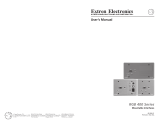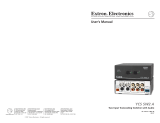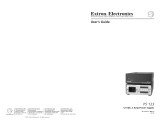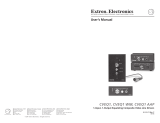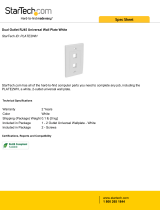Page is loading ...

AVTrac
®
International/Universal Models
Floor-mount Raceway with Modular AAP
Connectivity for A/V, Data, and Power
Installation Guide
68-1562-01
Rev. A
09 08

This symbol is intended to alert the user of important operating and maintenance
(servicing) instructions in the literature provided with the equipment.
This symbol is intended to alert the user of the presence of uninsulated dangerous
voltage within the product’s enclosure that may present a risk of electric shock.
Caution
Read Instructions • Read and understand all safety and operating instructions before using the equipment.
Retain Instructions • The safety instructions should be kept for future reference.
Follow Warnings • Follow all warnings and instructions marked on the equipment or in the user
information.
Avoid Attachments • Do not use tools or attachments that are not recommended by the equipment
manufacturer because they may be hazardous.
Warning
Power sources • This equipment should be operated only from the power source indicated on the product. This
equipment is intended to be used with a main power system with a grounded (neutral) conductor. The
third (grounding) pin is a safety feature, do not attempt to bypass or disable it.
Power disconnection • To remove power from the equipment safely, remove all power cords from the rear of
the equipment, or the desktop power module (if detachable), or from the power source receptacle (wall
plug).
Power cord protection • Power cords should be routed so that they are not likely to be stepped on or pinched by
items placed upon or against them.
Servicing • Refer all servicing to qualified service personnel. There are no user-serviceable parts inside. To
prevent the risk of shock, do not attempt to service this equipment yourself because opening or removing
covers may expose you to dangerous voltage or other hazards.
Slots and openings • If the equipment has slots or holes in the enclosure, these are provided to prevent
overheating of sensitive components inside. These openings must never be blocked by other objects.
Lithium battery • There is a danger of explosion if battery is incorrectly replaced. Replace it only with the
same or equivalent type recommended by the manufacturer. Dispose of used batteries according to the
manufacturer’s instructions.
Ce symbole sert à avertir l’utilisateur que la documentation fournie avec le matériel
contient des instructions importantes concernant l’exploitation et la maintenance
(réparation).
Ce symbole sert à avertir l’utilisateur de la présence dans le boîtier de l’appareil
de tensions dangereuses non isolées posant des risques d’électrocution.
Attention
Lire les instructions• Prendre connaissance de toutes les consignes de sécurité et d’exploitation avant
d’utiliser le matériel.
Conserver les instructions• Ranger les consignes de sécurité afin de pouvoir les consulter à l’avenir.
Respecter les avertissements • Observer tous les avertissements et consignes marqués sur le matériel ou
présentés dans la documentation utilisateur.
Eviter les pièces de xation • Ne pas utiliser de pièces de fixation ni d’outils non recommandés par le
fabricant du matériel car cela risquerait de poser certains dangers.
Avertissement
Alimentations• Ne faire fonctionner ce matériel qu’avec la source d’alimentation indiquée sur l’appareil. Ce
matériel doit être utilisé avec une alimentation principale comportant un fil de terre (neutre). Le troisième
contact (de mise à la terre) constitue un dispositif de sécurité : n’essayez pas de la contourner ni de la
désactiver.
Déconnexion de l’alimentation• Pour mettre le matériel hors tension sans danger, déconnectez tous les cordons
d’alimentation de l’arrière de l’appareil ou du module d’alimentation de bureau (s’il est amovible) ou
encore de la prise secteur.
Protection du cordon d’alimentation • Acheminer les cordons d’alimentation de manière à ce que personne ne
risque de marcher dessus et à ce qu’ils ne soient pas écrasés ou pincés par des objets.
Réparation-maintenance • Faire exécuter toutes les interventions de réparation-maintenance par un technicien
qualifié. Aucun des éléments internes ne peut être réparé par l’utilisateur. Afin d’éviter tout danger
d’électrocution, l’utilisateur ne doit pas essayer de procéder lui-même à ces opérations car l’ouverture ou le
retrait des couvercles risquent de l’exposer à de hautes tensions et autres dangers.
Fentes et orices • Si le boîtier de l’appareil comporte des fentes ou des orifices, ceux-ci servent à empêcher
les composants internes sensibles de surchauffer. Ces ouvertures ne doivent jamais être bloquées par des
objets.
Lithium Batterie • Il a danger d’explosion s’ll y a remplacment incorrect de la batterie. Remplacer uniquement
avec une batterie du meme type ou d’un ype equivalent recommande par le constructeur. Mettre au reut les
batteries usagees conformement aux instructions du fabricant.
Safety Instructions • English
Consignes de Sécurité • Français
Sicherheitsanleitungen • Deutsch
Dieses Symbol soll dem Benutzer in der im Lieferumfang enthaltenen
Dokumentation besonders wichtige Hinweise zur Bedienung und Wartung
(Instandhaltung) geben.
Dieses Symbol soll den Benutzer darauf aufmerksam machen, daß im Inneren des
Gehäuses dieses Produktes gefährliche Spannungen, die nicht isoliert sind und
die einen elektrischen Schock verursachen können, herrschen.
Achtung
Lesen der Anleitungen • Bevor Sie das Gerät zum ersten Mal verwenden, sollten Sie alle Sicherheits-und
Bedienungsanleitungen genau durchlesen und verstehen.
Aufbewahren der Anleitungen • Die Hinweise zur elektrischen Sicherheit des Produktes sollten Sie
aufbewahren, damit Sie im Bedarfsfall darauf zurückgreifen können.
Befolgen der Warnhinweise • Befolgen Sie alle Warnhinweise und Anleitungen auf dem Gerät oder in der
Benutzerdokumentation.
Keine Zusatzgeräte • Verwenden Sie keine Werkzeuge oder Zusatzgeräte, die nicht ausdrücklich vom
Hersteller empfohlen wurden, da diese eine Gefahrenquelle darstellen können.
Vorsicht
Stromquellen • Dieses Gerät sollte nur über die auf dem Produkt angegebene Stromquelle betrieben werden.
Dieses Gerät wurde für eine Verwendung mit einer Hauptstromleitung mit einem geerdeten (neutralen)
Leiter konzipiert. Der dritte Kontakt ist für einen Erdanschluß, und stellt eine Sicherheitsfunktion dar. Diese
sollte nicht umgangen oder außer Betrieb gesetzt werden.
Stromunterbrechung • Um das Gerät auf sichere Weise vom Netz zu trennen, sollten Sie alle Netzkabel
aus der Rückseite des Gerätes, aus der externen Stomversorgung (falls dies möglich ist) oder aus der
Wandsteckdose ziehen.
Schutz des Netzkabels • Netzkabel sollten stets so verlegt werden, daß sie nicht im Weg liegen und niemand
darauf treten kann oder Objekte darauf- oder unmittelbar dagegengestellt werden können.
Wartung • Alle Wartungsmaßnahmen sollten nur von qualiziertem Servicepersonal durchgeführt werden.
Die internen Komponenten des Gerätes sind wartungsfrei. Zur Vermeidung eines elektrischen Schocks
versuchen Sie in keinem Fall, dieses Gerät selbst öffnen, da beim Entfernen der Abdeckungen die Gefahr
eines elektrischen Schlags und/oder andere Gefahren bestehen.
Schlitze und Öffnungen • Wenn das Gerät Schlitze oder Löcher im Gehäuse aufweist, dienen diese zur
Vermeidung einer Überhitzung der empndlichen Teile im Inneren. Diese Öffnungen dürfen niemals von
anderen Objekten blockiert werden.
Litium-Batterie • Explosionsgefahr, falls die Batterie nicht richtig ersetzt wird. Ersetzen Sie verbrauchte
Batterien nur durch den gleichen oder einen vergleichbaren Batterietyp, der auch vom Hersteller
empfohlen wird. Entsorgen Sie verbrauchte Batterien bitte gemäß den Herstelleranweisungen.
Este símbolo se utiliza para advertir al usuario sobre instrucciones importantes
de operación y mantenimiento (o cambio de partes) que se desean destacar en el
contenido de la documentación suministrada con los equipos.
Este símbolo se utiliza para advertir al usuario sobre la presencia de elementos con
voltaje peligroso sin protección aislante, que puedan encontrarse dentro de la caja
o alojamiento del producto, y que puedan representar riesgo de electrocución.
Precaucion
Leer las instrucciones • Leer y analizar todas las instrucciones de operación y seguridad, antes de usar el
equipo.
Conservar las instrucciones • Conservar las instrucciones de seguridad para futura consulta.
Obedecer las advertencias • Todas las advertencias e instrucciones marcadas en el equipo o en la
documentación del usuario, deben ser obedecidas.
Evitar el uso de accesorios • No usar herramientas o accesorios que no sean especificamente recomendados
por el fabricante, ya que podrian implicar riesgos.
Advertencia
Alimentación eléctrica • Este equipo debe conectarse únicamente a la fuente/tipo de alimentación eléctrica
indicada en el mismo. La alimentación eléctrica de este equipo debe provenir de un sistema de distribución
general con conductor neutro a tierra. La tercera pata (puesta a tierra) es una medida de seguridad, no
puentearia ni eliminaria.
Desconexión de alimentación eléctrica • Para desconectar con seguridad la acometida de alimentación eléctrica
al equipo, desenchufar todos los cables de alimentación en el panel trasero del equipo, o desenchufar el
módulo de alimentación (si fuera independiente), o desenchufar el cable del receptáculo de la pared.
Protección del cables de alimentación • Los cables de alimentación eléctrica se deben instalar en lugares donde
no sean pisados ni apretados por objetos que se puedan apoyar sobre ellos.
Reparaciones/mantenimiento • Solicitar siempre los servicios técnicos de personal calicado. En el interior no
hay partes a las que el usuario deba acceder. Para evitar riesgo de electrocución, no intentar personalmente
la reparación/mantenimiento de este equipo, ya que al abrir o extraer las tapas puede quedar expuesto a
voltajes peligrosos u otros riesgos.
Ranuras y aberturas • Si el equipo posee ranuras o orificios en su caja/alojamiento, es para evitar el
sobrecalientamiento de componentes internos sensibles. Estas aberturas nunca se deben obstruir con otros
objetos.
Batería de litio • Existe riesgo de explosión si esta batería se coloca en la posición incorrecta. Cambiar esta
batería únicamente con el mismo tipo (o su equivalente) recomendado por el fabricante. Desachar las
baterías usadas siguiendo las instrucciones del fabricante.
Instrucciones de seguridad • Español
Precautions
安全须知 • 中文
这个符号提示用户该设备用户手册中有重要的操作和维护说明。
这个符号警告用户该设备机壳内有暴露的危险电压,有触电危险。
注意
阅读说明书 • 用户使用该设备前必须阅读并理解所有安全和使用说明。
保存说明书 • 用户应保存安全说明书以备将来使用。
遵守警告 • 用户应遵守产品和用户指南上的所有安全和操作说明。
避免追加 • 不要使用该产品厂商没有推荐的工具或追加设备,以避免危险。
警告
电源 • 该设备只能使用产品上标明的电源。 设备必须使用有地线的供电系统供电。 第三条线(
地线)是安全设施,不能不用或跳过 。
拔掉电源 • 为安全地从设备拔掉电源,请拔掉所有设备后或桌面电源的电源线,或任何接到市电
系统的电源线。
电源线保护 • 妥善布线, 避免被踩踏,或重物挤压。
维护 • 所有维修必须由认证的维修人员进行。 设备内部没有用户可以更换的零件。为避免出现触
电危险不要自己试图打开设备盖子维修该设备。
通风孔 • 有些设备机壳上有通风槽或孔,它们是用来防止机内敏感元件过热。 不要用任何东西
挡住通风孔。
锂电池 • 不正确的更换电池会有爆炸的危险。必须使用与厂家推荐的相同或相近型号的电池。按
照生产厂的建议处理废弃电池。

Introduction
AVTrac • Introduction
1
This manual describes the AVTrac
®
components and provides instructions for installation.
Low-profile Raceway System
AVTrac is a low-profile raceway system designed
to safely and discretely run power, data, and A/V
cables from a wall to a table, podium, or other
furniture. The raceway system mounts directly onto
the concrete floor and underneath the carpet.
AAP Compatible Connectivity Box
The modular enclosure supports up to ten single-
space Extron Architectural Adapter Plates (AAPs)
with hundreds of connection options creating a fully
customizable connectivity solution.
Models with the AC module accommodate up to seven
single-space AAPs. (AAPs are sold separately.)
Wheelchair Accessible
The slope of the side and end ramps is less than 1:12
(1 inch of rise for each 12 inches run, approximately
4.8°).
Choice of Finishes
The AVTrac 480C accommodates commercial grade
carpet inlay 1/4" to 5/16" (0.6 to 0.8 cm) thickness in
the aluminum raceway cap.
The AVTrac 480R accommodates the included black
Roppe rubber strip inlay as its top finish.
Extron AVTrac
®
AC Junction Box
Projector
Speakers
Extron AVTrac
®
c
MLS 406MA
MediaLink Switcher
CONTROL
PEAK
CLIP
SIGNAL
INPUT SELECT
1
2
3
4
5
6
LAN
Overview
AVTrac Floor System

Kit Contents
AVTrac • Kit Contents
2
Box 1
The AVTrac Kit is shipped in two boxes.
Box 1• contains the track and ramp components.
Box 2• contains the connectivity box, the conduit and accessory components.
Check the contents of each box to ensure all items are present.
Plastic Template (1)
Side Ramp (2)
Rubber Strip (1)
(only with #42-122-xx models)
Aluminum
Cover Track (1)
Aluminum
Base Track (1)
Checklist for contents of box 1
8' (2.44 m) aluminum base track (1)
7' 2" (2.18 m) aluminum cover track (1)
8' (2.44 m) side ramps (2)
8' (2.44 m) rubber strip (1) — #42-122-xx models only
Plastic wall base trim template (1)

Kit Contents
AVTrac • Kit Contents
3
Box 2
Check the contents of each box to ensure all items are present.
Checklist for contents of box 2
Connectivity box (1) with 6/32" nut (1) to secure AC power module
9.35" (23.7 cm) quarter-circle end ramps (2)
Cover AAP plate for AC power module (1)
Double-sided adhesive tape (1 roll of 15') for rubber inlay strip
3/16" masonry screws (30)
5/32" masonry drill bit (1)
Installation guide (1)
AC Power Module and Cable:
24' (7.32 m) unwired oval flex power conduit (shown) ( CO models: Universal module)
24' (7.32 m) double insulated cable (ISO models: French, European, and Universal modules)
Installation Guide (1)
Connectivity Box (1)
End Ramps (2)
Unwired
AC Power Conduit (1)
AC Power Module (1)
Cover AAP Plate for
AC Power Module (1)
5/32" Masonry Bit (1) and
3/16" Masonry Screws (30)
Double-sided Tape (1 roll)

Before Getting Started
AVTrac • Before Getting Started
4
AVTrac can be installed before new carpeting is fitted or retrofitted under pre-existing carpet. It can also be installed in
new construction before the wall and carpeting is in place. Retrofitting the track in a space with existing carpeting and
furniture requires some extra preparation to remove the carpet and prepare the floor for laying the track.
Before installing the AVTrac, determine whether the installation will be in new construction, under pre-existing carpet
tiles or under pre-existing carpet rolls, and follow the appropriate installation instructions (see page 7). Read and
follow all instructions carefully.
In-Wall Cable Routing Considerations
Locate a convenient electrical junction box in the wall or ceiling for power. The AC power module is rated at 10 A, •
maximum, and no fuse is used on the box. Extron recommends that the AC conduit is connected to a junction box that is
wired directly to a 10 A main circuit.
If cables are run in walls, the walls should be run in drywall cavities. The wall should be free of windows, studs, •
pipes, or other obstructions that could hinder cables runs (see the figure below).
Extron AVTrac™
Floor Mount Raceway System
Speakers
AC Junction Box
Projector
Studs
Window
LAN
Planning
Floor Considerations
AVTrac is designed to be installed only underneath commercial grade carpeting 1/4" to 5/16" (0.6 to 0.8 cm) in
thickness. It can be installed under new or pre-existing carpet tile or carpet roll.
AVTrac is not designed to be installed under vinyl composite tile (VCT).
N
All structural steps and electrical installation should be performed by qualified personnel in accordance with
local and national building codes and/or local and national electrical codes.

AVTrac • Before Getting Started
5
Conference Room
AVTr ac
Cable Cubby
MediaLink Controller
Room Considerations
Determine the A/V requirements for the room. Extron provides a complete range of AAPs that can be purchased
separately to provide fully customizable central connectivity.
Select the best configuration for existing furniture, equipment, cables and the AVTrac. It may help to mark the position
of the track using a marker pen or tape.
The connectivity box must be positioned under a podium or table to avoid creating a tripping hazard. AVTrac can be
cut or extended to meet the needs of the room. (For further details, see step 3-1 on page 9.)
Optional track component extension kits are also available.
Classroom
AVTr ac
Cable Cubby
MediaLink Controller
Wheelchair Accessibility
The slope and rise of the side and end ramps are less than 1:12 (1 inch of rise for each 12 inches run, approximately 4.5°).
4.5°
The AVTrac maximum slope is 4.5°

Before Getting Started,
cont’d
AVTrac • Before Getting Started
6
Almost everything you need to install your AVTrac system has been included. You will need some basic tools and
materials depending on the facility and requirements.
You can visit www.extron.com for a full range of cables and components for populating the connectivity box.
N
All structural steps and electrical installation should be performed by qualified personnel in accordance with
local and national building codes and/or local and national electrical codes.
Extron recommends the following equipment (not provided) to ensure the AVTrac is properly installed:
Tools:
Miter saw with blade for cutting metal
Handsaw for cutting drywall
Utility knives (box cutters)
Power drill
1/4" or 6 mm bit for drilling metal
Tin snips (metal shears)
Tools for terminating cables (if required)
Phillips head screw driver
Hex nut driver (1/4" and 5/16")
Equipment/other:
Tape measure
Marker pen
Level
Fish tape (used for pulling cables through cavity walls)
Cable ties
Vacuum cleaner
Carpet glue
Safety goggles
Tools and Equipment Required for Installation

Installation
AVTrac • Installation
7
Step 1: Floor
By this point you must have decided exactly where the AVTrac will be installed, checked the contents of the kit, and
gathered the tools that you will need.
Extron recommends consulting a carpeting expert before removing the carpet.
1-1 Determine whether the installation will be in new
construction, under pre-existing carpet tiles or under
pre-existing carpet rolls, and follow the appropriate
instructions.
New Construction
Remove carpet tiles to expose concrete
1
2
3
4
Side Ramps
Base Trac
k
End Ramps
Carpet
Cut prelaid carpet roll to expose concrete
When AVTrac is being placed in a new building, the
carpet should not be laid until the track has been
installed.
Prelaid Carpet Tiles
For installation of AVTrac under prelaid carpet tiles,
peel back the carpet to expose the concrete where the
track and side ramps will be positioned (as shown in
figure to the right).
Prelaid Carpet Rolls — Peel back Carpet
If AVTrac is being installed in a room that is already
fitted with carpet rolls, the ideal solution is to peel
back the entire carpet roll(s) covering the area where
the track will run.
Prelaid Carpet Rolls — Cut Carpet
Whenever possible, completely remove the carpet
from where the track will be laid. When the
positioning of preinstalled furniture makes it
impossible to remove existing carpet, the carpet must
be cut (see the illustration at right).
a. Use tape to mark where the track and ramps will
be positioned and make one straight cut
1
in the
middle of where the base track will run (see the
figure to the right). This cut must be the same
length as the base track.
b. Make three shorter cuts
2
,
3
, and
4
corresponding to, but about 4" (10.2 cm) longer
than the edges of the end ramps. These cuts must
be clean as the carpet needs to be seamed after the
AVTrac has been installed.
c. Pull the carpet back to expose the floor where the
base track, the side ramps and the end ramps will
be secured.
After removing the carpet, make sure that the
concrete base is level and structurally sound.
Prior to installation, leveling and topping may be
needed.
N
AVTrac is not designed to be installed under vinyl
composite tile (VCT).

Installation
AVTrac • Installation
8
Step 2: Wall
Cut cable access hole in wall
2-2 Using a drill, box cutters and/or a saw, cut a 4" W x
1½" H (10.2 cm x 3.8 cm) hole at the base of the wall.
If there is a metal base stud, use a hand saw or tin
snips to cut it at both edges of the hole and bend
it back into the hole so that the stud lies flat on the
floor. (Use a file to remove any jagged edges that
might damage cables.)
The hole will eventually be covered by the
baseboard, so it does not have to be perfect.
4" (10.2 cm)
1½" (3.8 cm)
Mark wall
2-1 If necessary, remove the baseboard from the bottom
of the wall and mark where the AVTrac will abut the
wall.
This manual shows an AVTrac installation with cables being run inside a drywall cavity. If the cables from the AVTrac
system will not be run inside a drywall cavity, ignore this section and go to Step 3 (Track) on the next page.
To run cables from the AVTrac system inside a drywall cavity, follow these instructions:

Installation
AVTrac • Installation
9
Step 3: Track
Measure and cut track
10.00"
(25.4 cm)
Connectivity (AAP) Box
Rubber Strip
Aluminum
Cover Trac
k
7'-2"
(2.184 m)
9.36"
(23.77 cm)
8'-0"
(2.438 m)
End Ramp
Side Ramp
Cut aluminum base track
3-1 Measure and cut the track pieces to the desired
length.
N
If the track is to be cut, the base track must be
10” (25.4 cm) longer than the cover track. This
is the length of the connectivity box, which sits
on the base track but not on the cover track (see
figure below right).
The end ramps will add an additional 9.36”
(23.8 cm) to the total length of the installed track.
The track should run up to but not enter the hole in
the wall.

Installation
AVTrac • Installation
10
Step 3: Track, cont’d
Pre-drill holes to secure connectivity box
End Plate
End Plate
Cover
Mounting Holes
The end of the
Connectivity Box
with three
mounting holes
faces back
towards the track.
3-3 Remove the cover panel and end plates
from the connectivity box.
Examine the bottom of the connectivity
box: one end has two mounting holes (one
in each corner), the other end has three
mounting holes (one in each corner and
one in the center). The end with three holes
faces back toward the track.
Align the end of the box with two
mounting holes with the end of the
base track. Mark where the mounting
holes in the bottom of the box lie over
the base track.
Using a 1/4" or 6 mm bit for drilling
metal (not supplied), drill at least three
mounting holes in the base track to
secure the connectivity box.
To fully assemble the track and attach
it securely to the floor (as shown in the
figure at right), follow the instructions
on the next page.
Pre-drill holes in track and ramps
3-2 Drill mounting holes in the shallow grooves of the
base track and side ramps using a 1/4" or 6 mm bit
for drilling metal (not supplied).
N
Mounting holes must be a maximum of 3'
(91 cm) apart and one must be within 6"
(15.2 cm) of each end of the track.
Shallow Groove
in Side Ramp
(pre-drill holes)
Shallow Groove
in Base Track
(pre-drill holes)
Side Ramp
Base Track
To ensure that all components are securely
attached to the floor, Extron recommends that
the predrilled holes should closely follow the
pattern shown in this figure.
Positions of mounting holes

AVTrac • Installation
11
Drill a 5/32” x 1 1/2” deep hole
into concrete.
Supplied Masonry Screws
Drill into concrete and screw down track
Screw side ramps to floor
3-6 With the provided masonry screws, secure the
track and ramps to the floor.
3-5 Using the provided 5/32" masonry bit, drill
1 1/2" (3.8 cm) deep pilot holes into the concrete
through the predrilled mounting holes in the
track and ramps.
N
Do not use the holes that were drilled to
secure the connectivity box in step 3-3.
3-4 Lay the base track on the floor in the prepared
location.
Mate the tabs in the side ramps with the grooves
in the base track, and place the end ramps in
position at the end of the track furthest from the
wall.
Ta b on side ramp
mates with groove
in base track.
Side Ramp
Base Trac
k
Mate side ramp to base track

Installation
AVTrac • Installation
12
Step 4: Connectivity Box
By this point, the base track, side ramps and end ramps must be securely fastened to the floor.
To attach the connectivity box to the base track, follow these instructions:
Secure connectivity box to the floor
Masonry
Screws
The end of the connectivity
box with three mounting holes
faces back towards the track.
4-1 Reposition the connectivity box, in the correct
orientation, over the pre-drilled holes in the base track
(see instruction 3-3).
The end of the connectivity box that has three mounting holes
faces back towards the track.
Using at least three of the provided 3/16" masonry
screws, secure the box to the track and floor.
Remove all dust with a vacuum cleaner.

Installation
AVTrac • Installation
13
Step 5: Power Module
(F) (D) (E)
Receptacles for the AC power modules are available in Australian (F),
universal (J), central European (D), and French (E) models. The Australian
and Universal models are provided with 24' of metal conduit, without
wires (CO models). The Central European, French, and Universal models
are provided with 24' of double insulated cable (ISO models).
5-1 Connect wires to models with the unwired metal
conduit (Australian and Universal CO models) by
threading wires through the conduit using fish tape
or similar device. Remove 1/8" (3 mm) of insulation
from both ends of each wire.
Loosen the holding screws in the AC receptacle.
Insert the wire into appropriate hole and tighten the
holding screws.
Snap the AC receptacle into power module.
W
The blue or black wire must be connected to the neutral
slot, the brown or red wire must be connected to the live
slot, and the solid green or green and yellow striped wire
must be connected to the ground.
(J)
By this point, the connectivity box must be securely fastened to the floor.
If the AVTrac system does not include the AC power module, ignore this section. To attach the AC power module,
follow these instructions:
W
Switch off all electrical power before connecting the
AC conduit to a junction box, and keep power off until
installation is complete.
C
All electrical installation should be performed by
qualified personnel in accordance with local and national
electrical codes.
Connect wires to AC receptacle
LN
Brown
or Red
(live)
Blue or
Black
(neutral)
Green
or Green/
Yellow
(ground)
N
Some plug types are not fully compatible with the Universal
Receptacle. For more details refer to the Universal AC Outlet
Compatibility Guide on page 22.

Installation
AVTrac • Installation
14
Step 5: Power Module cont’d
5-2 The AC power module must be positioned under the
triple AAP socket that is closest to the track. Seat the
power module on the stud in the connectivity box.
Slide the power module side tabs into the slots on
the side of the connectivity box.
Secure the module to the stud on the connectivity
box by hand tightening the provided 6/32" nut.
Attach AC power module
Slots
Studs
AC Power
Module
Tabs
5-3 Extron recommends the circuit be attached to a
junction box that is directly wired to the main circuit.
The AC power module does not have a fuse and is rated at
10 A, maximum.
Feed the fish tape from the junction box, through the
wall cavity or raceway to the point where the AC
conduit or double insulated cable from the AVTrac
enters the wall or raceway.
Attach the end of the conduit or cable securely to the
hook on the fish tape and rewind the tape, drawing
the cable behind it. If necessary, one person can feed
the conduit or cable into the wall or channel while a
second pulls the fish tape from the other end.
Connect the wires as shown in the figures below:
Run AC conduit through wall cutout
Conduit
Junction Box
Green/Yellow
(ground)
Cable/AC Conduit
From AVTrac AC
Power Module
To 10 Amp
Main Circuit
Blue/Black
(neutral)
Brown/Red
(live)
Connect AC conduit to junction box
N
The illustration at right shows the Central
European AC power module. Australian,
French, and Universal models are also available.
Connect double isolated cable to
junction box
Conduit
Junction Box
Green/Yellow
(ground)
Double insulated
AC cable
From AVTrac AC
Power Module
To 10 Amp
Main Circuit
Blue/Black
(neutral)
Brown/Red
(live)
Cable
restraint

Installation
AVTrac • Installation
15
Step 6: AAPs
At this point, the track, ramps and connectivitly box must all be securely in place, and the AC power module must be
attached to the connectivity box and connected to an AC junction box.
To attach the Architectural Adapter Plates (AAPs), follow these instructions:
6-1 Select up to seven AAPs to fill the remaining spaces
in the cover of the connectivity box.
In models without the AC power module, fill all ten spaces
of AAPs.
6-2 Use fish tape to run the cables from the connectivity
box through the wall or raceway to the appropriate
appliances (as described in section 5-3).
Attach the cables to the AAPs as described in the
installation guide for each AAP module and secure
the AAP to the cover of the connectivity box, using
the screws provided.
Test the power and signals to the AAPs.
Install AAPs
Run cable to AAPs
2.88" (7.30 cm)
2.50" (6.30 cm)
N
To prevent bending of cables, place the
AAP with the greatest depth requirement
(including cables) in the AAP slot closest to
the center ridge of the connectivity box.
End Plate
End Plate
Cover
Openings for
AAPs
AC Outlet
Cover Plate
RGB 580xi SI AAP
COMPUTER
AUDIO
H SHIFT
INPUT
SELECT
AAP
6-3 Reattach the end plates and cover panel.
End Plate
End Plate
Cover
AAPs
RGB 580xi SI AAP
COMPUTER
AUDIO
H SHIFT
INPUT
SELECT
N
Extron AAPs must be purchased separately.

Installation
AVTrac • Installation
16
Step 7: Finishing Up
At this point, the track and connectivity box must be secured to the floor, the electrical power must be connected, and
the AAP sockets must be populated.
To complete the installation of the AVTrac, follow these instructions:
7-1 Lay the cables and power cords flat against the base
track. If necessary, feed excess cable back into the
wall.
7-2 Snap the cover track onto the base track.
Ensure cables lay flat
Fit cover track
7-3 Before cutting and gluing carpet, remove all dust
and debris with a vacuum cleaner.
Cut the carpet or carpet tiles so that they run up
to but do not cover the aluminum track (see the
diagram below).
Cut carpet
Carpet covers ramps
but not track.
N
Cut the carpet to abut the edge of the cover
track. Do not align the cuts to the edge of
the ramps as this will leave a gap between
the end of the carpet and the cover track.

AVTrac • Installation
17
7-4 Glue or tape the carpet to the floor and side ramps.
Refit carpet
7-5 Using the provided template, trim the wall
baseboard to fit snugly around the track. Attach the
baseboard to the wall.
Use template to cut base board
7-6 For 42-122-xx models, attach the provided rubber
strip to the cover track raceway using double-sided
adhesive tape (provided).
For 42-121-xx models, cut a strip of the finished
carpeting and glue it to the cover track raceway.
Attach carpet tile to track raceway
Reattach base board to wall
N
Do not use the supplied tape to attach the
carpet to the ramp. The tape is intended
only for the attaching the rubber inlay strip
to the cover track.

Installation
AVTrac • Installation
18
Step 7: Finishing up cont’d
The installed AVTrac safely and discretely runs
power, data, and A/V cables from a wall to a table,
podium, or other furniture.
AVTrac installed
/


